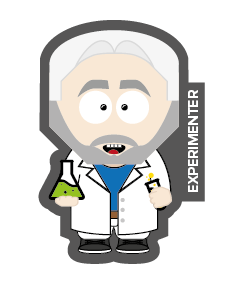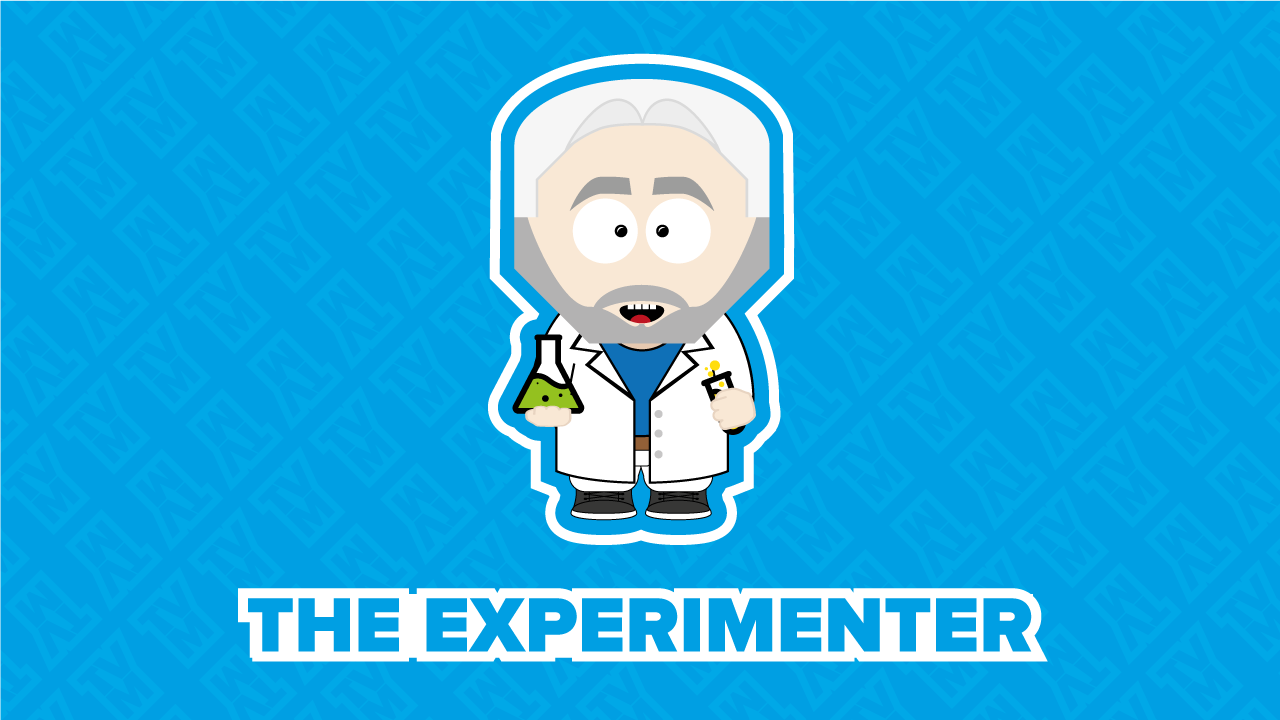
What is an Experimenter?
Sir Isaac Newton, Louis Pasteur, Marie Curie, Albert Einstein, and Nikola Tesla; this woman and these gentlemen are considered to be some of the greatest scientists of all time. If it wasn’t for people like Nikola Telsa, then maybe you wouldn’t have been able to read this article and maybe we wouldn’t have written it in the first place. It is these scientists, these innovators, and these Experimenters who are the driving force of innovation.
“No amount of experimentation can ever prove me right; a single experiment can prove me wrong.”
— Albert Einstein —
When taking the stance of an Experimenter, The Product Owner explains what we know AND what we don’t know. They state hypotheses and assumptions, instead of User Stories and requirements. They see the work that the team does as experiments to discover new and hidden value, rather executing and delivering ‘set-in-stone’ work packages. The Experimenter understands that there is more unknown than known and therefore feels the need of trying out new things, explore, innovate, and experiment.
An experimentalist, a researcher whose primary focus is on experiments.
— Wikipedia, October 2019 —Innovators are the persons or organizations who are one of the first to introduce into reality something better than before.
— Wikipedia, October 2019 —An experiment is a procedure carried out to support, refute, or validate a hypothesis.
— Wikipedia, October 2019 —
The Experimenter stance is also referred to as the Innovator, the Scientist, the Dreamer and the Imaginative Product Owner.
The Experimenter Product Owner and Agile
Looking at some of the success elements [reference 1, 2 and 3] that contribute to creating a great culture of innovation in organizations, we find that some of the Agile Manifesto principles make a big impact and contribute to successful innovation and experimentation in organizations:
1. “Our highest priority is to satisfy the customer through early and continuous delivery of value (originally: valuable software).”
4. “Business people and developers must work together daily throughout the project”
5. “Build projects around motivated individuals. Give them the environment and support they need, and trust them to get the job done.”
Looking at other sources, such as the book The Professional Product Owner or the contents of a Professional Scrum Product Owner training, Product Owners do have a great deal to do with experimentation, innovation, and hypothesis-driven development.
From a Product Management, Agile and a Professional Scrum perspective, we can only say that taking the Experimenter stance every now and then is key to being a successful Product Owner. The Product Owner is responsible for maximizing the value of the product after all and one way to unlock new and undiscovered value is by doing a lot of experiments, right?
What great Experimenters do
With the many Product Owners and Product Managers we have trained and coached in their daily practice, we’ve observed the following patterns in the way that Product Owners act as Experimenters:
- Think of what might be; Great experimenters are optimistic about the future. They are also consumed with making tomorrow better than today. These experimenters and hopeful leaders never settle with today is good enough, they always strive to make tomorrow even better. It is this focus on what might be, instead of what currently is, in combination with a relentless challenging of the status quo that makes great experimenters successful.
- They are never afraid of failures; Great experimenters know that Winston Churchill was right when he said: “Success is walking from failure to failure with no loss of enthusiasm.” Great experimenters know that there will be challenges along the way. They know they may encounter setbacks. They are not afraid of failures because they know that failures are part of the process. But, they also know the great value of new discoveries.
- Great innovators are brilliantly lazy; It’s like Bill Gates once said: “I choose a lazy person to do a hard job. Because a lazy person will find an easy way to do it.” Gates could substitute “a lazy person” with “an innovative person” because great innovators will find the best and easiest way to get a project done. Many great innovators live by the saying, “Work smarter, not harder.”
- They pursue multiple options; Elon Musk has Tesla, Space-X and Solar City. Marcus Lemonis is chairman and CEO of Camping World, Good Sam Enterprises, Gander Outdoors, and The House Boardshop, besides being investor and shareholder in dozens of companies. Although not everyone is like Elon or Marcus, what we can learn from them is that it’s a great idea to pursue multiple options. What is seen often in Marcus’ show The Profit, is that all the various companies positively affect each other. What we can learn from this is that alternative interests overlap and feed off each other. Having multiple projects breaks the psychological-bottleneck and pressure of succeeding in one single venture. And besides that, it will also expand your breadth of knowledge and overall business acumen.
- They embrace paradoxical thinking and keep themselves updated; A good experimenter never stops learning. And actually, a great one would never remain uninformed about the new discoveries and advances. Great innovators do not see the world in black and white. While many people come to “either/or” conclusions, they strive to see “both/and.” F. Scott Fitzgerald, a great American novelist said it best, “The test of a first-rate intelligence is the ability to hold two opposing ideas in mind at the same time and still retain the ability to function.”

The Product Owner as an Experimenter
Obviously, not all (Product Owner) Visionaries are the same. That being said, some positive outcomes and benefits that we observe when Product Owners take the Visionary stance more often is:
- Improved productivity & reduced costs; In many organizations, process innovation is about reducing costs. This might be achieved by improving capacity and/or flexibility of the business — in order to enable it to exploit economies of scale;
- Better product and service quality; By definition, high-quality products and services are more likely to meet customer and user needs. Assuming that these products and services are effectively marketed and sold, this should result in higher sales and high profits for the organization;
- Building a larger product and services range; A business with a single product or limited product range would almost certainly benefit from innovation. Having broader products and services range provides an opportunity for higher sales and bigger profits and also reduces the risk for shareholders;
- Innovation contributes to handling legal and environmental issues; Innovation might enable the business to reduce its carbon emissions, produce less waste or perhaps comply with changing product legislation. Changes in laws often force business to innovate when they might not otherwise do so;
- More added value; Effective innovation is a great way to establish a unique selling proposition (“USP”) for a product — something which the customer is prepared to pay more for and which helps a business differentiate itself from competitors;
- Improved staff retention, motivation, and easier recruitment; Not an obvious benefit, but often significant. Potential good quality recruits are often drawn to a business with a reputation for innovation. Innovative businesses have a reputation for being inspiring places in which to work.
- Increased chances of discovering the next big thing; When pursuing multiple options, running tons of experiments and taking every stakeholder request as an assumption and hypothesis (instead of a demand), we see that that our chances of building the next big thing increase. As it is well described in this article, Mark Zuckerberg and Jeff Bezos explain that it may take you like 10.000 experiments a year to become as successful as their companies are.
- And although there may be other benefits as well, regularly taking an Experimenter stance as a Product Owner will hopefully lead to improvedTime to Market, Time to Learn, Ability to Innovate and hopeful to new ground-breaking products that boost revenues and have an amazing Customer Satisfaction Score.
References
- The Professional Scrum Product Owner Book
- https://www.lead-innovation.com/english-blog/success-factors-for-the-introduction-of-innovation-management
- https://www.michaelpage.nl/en/advice/management-advice/leadership/success-factors-innovation-ecosystem
- https://www.viima.com/blog/innovation-management-best-practices
- https://www.enago.com/academy/behave-like-a-professional-scientist/
- https://www.forbes.com/sites/rebeccabagley/2014/01/15/the-10-traits-of-great-innovators/#4b0ae8b84bf4
- https://www.entrepreneur.com/article/250777
- https://ideascale.com/10-qualities-of-great-innovators/
- https://inusual.com/en/blog/five-characteristics-that-define-successful-innovators
- https://www.innovationexcellence.com/blog/2015/03/13/7-characteristics-of-highly-successful-innovators/
- https://www.tutor2u.net/business/reference/innovation-benefits-risks
- https://www.nibusinessinfo.co.uk/content/advantages-innovation
- https://www.allbusiness.com/4-benefits-innovation-business-111251-1.html
- https://smallbusiness.chron.com/advantages-innovation-companies-30771.html
- https://startupnation.com/trending/creativity-innovation-workplace/
Business & Finance Articles on Business 2 Community
(77)








